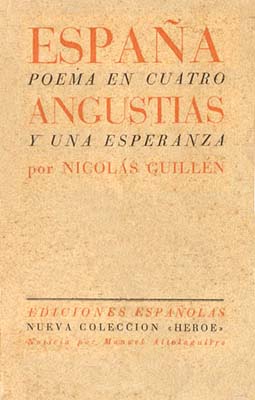4.1.1.14.4 The poetry collection “Four Anguishes and a Hope”, by Nicolás Guillén, 1937

This collection of poems is a tribute to the victims and revolutionaries who opposed the fascist coup of 1936, written while the bloody Spanish Civil War was taking place.
The work consists of five poetic pieces, centered on the need to support the Spanish people’s struggle against the reactionary forces led by Francisco Franco. This call was heeded by many Cubans, including Pablo de la Torriente Brau, one of our first internationalists.
Although the text’s primary purpose is to foster solidarity among peoples, vindicating the legacy of Martí, which can be summarized in the apostle’s phrase, “Homeland is humanity,” Guillén, within the broad scope of meaning that his texts generally endow, suggestive of a multiplicity of readings, once again raises the question of the Hispanic roots of our culture.
Reconciliation with what was once the “Motherland” constitutes, in this sense, a historical imperative, fulfilled with the establishment of the “Revista de Avance” and with a new direction in Guillén’s poetry. The arrangement of the poems demonstrates a desire for historical order, to settle the debt with the past and foster a future of solidarity among nations that can be sister nations by virtue of a common language and now under the common fire of their struggles.
The first of the anguishes – entitled “First Anguish” – a name that the others would keep, varying only the ordinal adjective, alludes to the process of conquest but not as an antagonism but rather from both powers, the Spanish and the American, a force of ancestral historical roots can be articulated that allows the fascist troops to be defeated.
The second and third anguishes complement from a lyrical point of view the need for fusion, already in the combatant blood, and the fourth constitutes a lament for the murder of the poet Federico García Lorca, carried out by fascist hitmen.
“The Hopeful Voice” returns to the initial point of proposing a fusion between peoples, a great ecumene, but from the perspective of the oppressed and their struggles, not a coalition between oppressive regimes. As an heir to the Hispanic, Cubans can now contribute culturally to the ancient matrix, reciprocating influences not only culturally but also from a military perspective. The poems present a great deal of subjectivity, manifested through the epic nature of lyrical tones, or vice versa.








